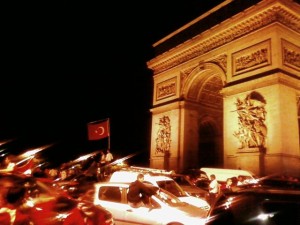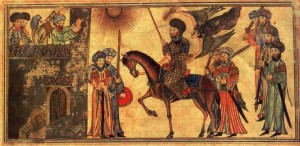Michel Houllebecq is making waves in Europe with his latest novel. Soumission (Submission) paints a picture of France in the not-too-distant future which most readers have found quite compelling due to its believability. A bestseller on Amazon.fr for weeks, and now flying off the shelves in German translation, Soumission presents a real challenge to the average reader, albeit admittedly incomplete.
Is Technology Ruining Your Life? Take A Quick Quiz To Find Out By Clicking Here.
The novel’s plot is now well-known: the reader is taken to France in 2022, where Ben Abbes, head of an Islamist party, defeats National Front candidate Marine LePen in the national elections to become France’s first Muslim president. The narrator Francois, symbolizing the average Frenchman, gives his reactions to this and other related news items throughout the novel while trying to go about his life, recounting his country’s quiet surrender to Islamic rule. The transformation of French society in a short time comes out in the push for liberalized laws as regards polygamy, French women leaving the workforce in droves, as well as the transformation of the Sorbonne into a Koranic university, among others.
Questions Left Unanswered
Mr. Houellebecq indeed deserves credit for bringing certain issues in Western society to  the forefront and inviting his readers to deep thought over important topics. The Islamization of French and Western culture is taking us down a certain path, and Mr. Houellebecq gives a plausible scenario of this path’s termination point.
the forefront and inviting his readers to deep thought over important topics. The Islamization of French and Western culture is taking us down a certain path, and Mr. Houellebecq gives a plausible scenario of this path’s termination point.
Critics have praised the novel, heralding it as a warning to the West, one reader labeling it “more prescient than provocative.” This prescience, however, leaves much to be desired as to the means of avoiding such a realistic future.
In Houellebecq’s future, Islamic domination does not come through intimidation and violence, but through appealing to the hedonism of Western man in order to slowly take control via gradual accommodation. The novel’s very title, Submission, in itself is an accurate translation of the term Islam. The logical question arises: To avoid such a future, what must be done to reverse the trend of Islamization of France and the West? An Islamic Republic of France may be farfetched for the year 2022, but what about 2122?
A Grand Return: The Only Lasting Solution
The answer to these and other important questions for the French and all living in the West lies not in contemplating scenarios of a possible future, but looking to see where things went wrong and return to the guiding principles of the past. Given the current state of cultural, political, and social affairs in France and elsewhere, one would guess history only commenced in 1789 with the outbreak of the French Revolution.
Yet the Muslims’ collective memory is indeed much longer. Though 1789 played into their hands with the Eldest Daughter of the Church attacking both God and King, the long view goes back to the year 732. This is when the Christian nobility of France united under Charles Martel and stopped the Muslim invasion of Europe, chasing the invading Arab armies back across the Pyrenees. The Cross of Christ, embraced by Charles Martel and his compatriots, was victorious over the crescent of Mohammed.
 The result of this series of important battles laid the groundwork for Christian Civilization to take root, in France and throughout Europe. Towering cathedrals, fortified castles, flourishing cities and towns, the invention of universities, hospitals, and so many other innovations came about for which the entire world still reaps the benefits. With the Renaissance came a decadence which opted for Christ without the Cross, and the French Revolution brought an abandonment of both Christ and the Cross.
The result of this series of important battles laid the groundwork for Christian Civilization to take root, in France and throughout Europe. Towering cathedrals, fortified castles, flourishing cities and towns, the invention of universities, hospitals, and so many other innovations came about for which the entire world still reaps the benefits. With the Renaissance came a decadence which opted for Christ without the Cross, and the French Revolution brought an abandonment of both Christ and the Cross.
What must be done to reverse the trend toward Islamization? France and the West must once again embrace the Cross of Christ, abandoning the worldliness of secularism and the submission of Islam, opting for the true civilization built on the principles of the Gospel.
Such a radical change of society will take true Christian fortitude from vast numbers of individuals who will fight for Christian Civilization. John Horvat II in his recent book Return to Order: From a Frenzied Economy to an Organic Christian Society, states it quite well: “Like it or not, the minute we cease to fight for our Christian culture, we prepare ourselves for defeat. Unless society be permeated by the fortitude needed to confront this great struggle, all our efforts come to nothing.”(1)
A Glorious Future Awaits
When men embrace the Cross with a spirit of abnegation and Christian fortitude following Christ as their model, the transformative power of such a movement of soul cannot be underestimated.
In conclusion, pacifistic secularism is no match for Islam, whether militant or covert, and readers of Soumission would be wise to bear in mind the words of St. Pius X addressed to France which point to the only lasting solution:
“A day will come, and we hope it is not far off, when France, like Saul on the road to Damascus, will be enveloped in a celestial light and hear a voice that repeats to her: ‘My  daughter, why dost thou persecute me?’ And to her response, ‘Who art thou, Lord’ the voice will reply: ‘I am Jesus, whom thou persecutest. It is hard to thee to kick against the goad, because in thine obstinacy thou destroyest thyself.’ And she, trembling and filled with wonder, will say; ‘Lord, what wouldst thou have me do?’ And He: ‘Arise, wash away the stains that have disfigured thee, awaken in thy breast the dormant sentiments and the pact of our alliance and go, first-born daughter of the Church, predestined nation, vessel of election, go as in the past, bear my name before all the peoples and the kings of the earth” (Consistorial Allocution Vi ringrazio, of November 29, 1911, in Acta Apostolicae Sedis, Typis Poliglottis Vaticanis, Rome, 1911, p. 657).
daughter, why dost thou persecute me?’ And to her response, ‘Who art thou, Lord’ the voice will reply: ‘I am Jesus, whom thou persecutest. It is hard to thee to kick against the goad, because in thine obstinacy thou destroyest thyself.’ And she, trembling and filled with wonder, will say; ‘Lord, what wouldst thou have me do?’ And He: ‘Arise, wash away the stains that have disfigured thee, awaken in thy breast the dormant sentiments and the pact of our alliance and go, first-born daughter of the Church, predestined nation, vessel of election, go as in the past, bear my name before all the peoples and the kings of the earth” (Consistorial Allocution Vi ringrazio, of November 29, 1911, in Acta Apostolicae Sedis, Typis Poliglottis Vaticanis, Rome, 1911, p. 657).
(1) Return to Order: From a Frenzied Economy to an Organic Christian Society, pg. 302



